
Lev Davidovich Bronstein, better known as Leon Trotsky, was a Russian revolutionary, Soviet politician, journalist, and political theorist. He was a central figure in the 1905 Revolution, October Revolution, Russian Civil War, and the establishment of the Soviet Union. Alongside Vladimir Lenin, Trotsky was widely considered the most prominent Soviet figure and was de facto second-in-command during the early years of the Russian Soviet Republic. Ideologically a Marxist and a Leninist, his thought and writings inspired a school of Marxism known as Trotskyism.

Leninism is a political ideology developed by Russian Marxist revolutionary Vladimir Lenin that proposes the establishment of the dictatorship of the proletariat led by a revolutionary vanguard party as the political prelude to the establishment of communism. Lenin's ideological contributions to the Marxist ideology relate to his theories on the party, imperialism, the state, and revolution. The function of the Leninist vanguard party is to provide the working classes with the political consciousness and revolutionary leadership necessary to depose capitalism.

The Russian Revolution was a period of political and social change in the Russian Empire, starting in 1917. This period saw Russia abolish its monarchy and adopt a socialist form of government following two successive revolutions and a bloody civil war. The Russian Revolution can also be seen as the precursor for the other European revolutions that occurred during or in the aftermath of World War I, such as the German Revolution of 1918–1919.

Trotskyism is the political ideology and branch of Marxism developed by Russian revolutionary and intellectual Leon Trotsky along with some other members of the Left Opposition and the Fourth International. Trotsky described himself as an orthodox Marxist, a revolutionary Marxist, and a Bolshevik–Leninist as well as a follower of Karl Marx, Frederick Engels, Vladimir Lenin, Karl Liebknecht, and Rosa Luxemburg.
Bolshevism is a revolutionary socialist current of Soviet Leninist and later Marxist–Leninist political thought and political regime associated with the formation of a rigidly centralized, cohesive and disciplined party of social revolution, focused on overthrowing the existing capitalist state system, seizing power and establishing the "dictatorship of the proletariat".
Max Shachtman was an American Marxist theorist. He went from being an associate of Leon Trotsky to a social democrat and mentor of senior assistants to AFL–CIO President George Meany.
"Dual power" refers to the coexistence of two Russian governments as a result of the February Revolution: the Soviets, particularly the Petrograd Soviet, and the Russian Provisional Government. The term was first used by the communist Bolshevik leader Vladimir Lenin (1870–1924) in the Pravda article titled "The Dual Power".
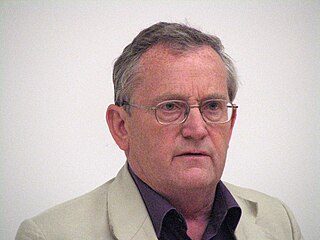
Robert John Service is a post-revisionist British historian, academic, and author who has written extensively on the history of the Soviet Union, particularly the era from the October Revolution to Stalin's death. He was until 2013 a professor of Russian history at the University of Oxford, a Fellow of St Antony's College, Oxford, and a senior Fellow at Stanford University's Hoover Institution. He is best known for his biographies of Vladimir Lenin, Joseph Stalin, and Leon Trotsky. He has been a fellow of the British Academy since 1998.
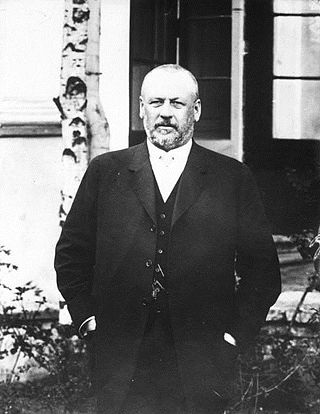
Mikhail Vladimirovich Rodzianko was a Russian statesman of Ukrainian origin. Known for his colorful language and conservative politics, he was the State Councillor and chamberlain of the Imperial family, Chairman of the State Duma and one of the leaders of the February Revolution of 1917, during which he headed the Provisional Committee of the State Duma. He was a key figure in the events that led to the abdication of Nicholas II of Russia on 15 March 1917.

V. Volodarsky was a Marxist revolutionary and Soviet politician. He was assassinated in 1918.

The Order No. 1 was issued March 1, 1917 and was the first official decree of the Petrograd Soviet of Workers' and Soldiers' Deputies. The order was issued following the February Revolution in response to actions taken the day before by the Provisional Committee of the State Duma, headed by Mikhail Rodzianko. On February 28, the Provisional Committee, acting as a government following the disintegration of Tsarist authority in Petrograd and fearing that the soldiers who had gone over to the revolution on February 26–27 (O.S.) without their officers constituted a potentially uncontrollable mob that might threaten the Duma, issued an order through the Military Commission of the Duma calling on the soldiers to return to their barracks and to obey their officers. The soldiers were skeptical of this order; for one thing, they saw Rodzianko as too close to the Tsar. Some soldiers perhaps feared that in sending them back to their barracks, he was attempting to quash the Revolution, though most were concerned that in being sent back to the barracks they would be placed under their old commanders whose heavy-handedness had led them to mutiny on the 26th; thus their grievances would go unaddressed. In response, the Petrograd Soviet issued Order Number 1.

Aleksandr Konstantinovich Voronsky was a prominent humanist Marxist literary critic, theorist and editor of the 1920s, disfavored and purged in 1937 for his work with the Left Opposition and Leon Trotsky during and after the October Revolution. Voronsky's writings were hidden away in the Soviet Union, until his autobiography, Waters of Life and Death, and anthology, Art as the Cognition of Life were translated and published in English.
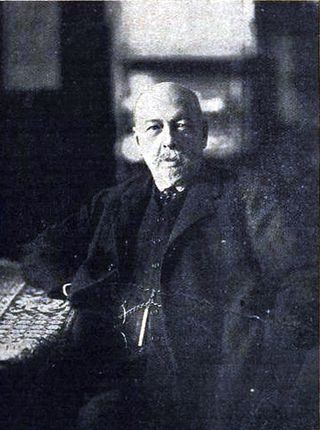
Prince Vladimir Petrovich Meshchersky was a Russian journalist and novelist who, throughout his career, wielded significant political clout.
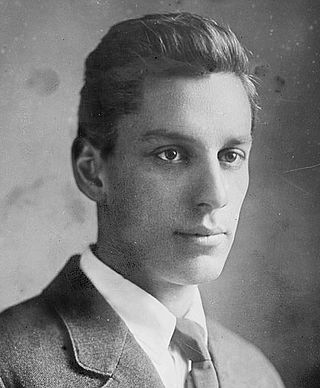
Max Forrester Eastman was an American writer on literature, philosophy and society, a poet and a prominent political activist. Moving to New York City for graduate school, Eastman became involved with radical circles in Greenwich Village. He supported socialism and became a leading patron of the Harlem Renaissance and an activist for a number of liberal and radical causes. For several years, he edited The Masses. With his sister Crystal Eastman, he co-founded in 1917 The Liberator, a radical magazine of politics and the arts.

Tsar to Lenin is a documentary and cinematic record of the Russian Revolution, produced by Herman Axelbank. It premiered on March 6, 1937, at the Filmarte Theatre on Fifty-Eighth Street in New York City. Pioneer American radical Max Eastman (1883-1969) narrates the film. Because of its pro-Trotskyist position, the film was suppressed by the Stalinists of the American Communist Party and was only widely available in a shortened format in the Library of Congress until its re-release in 2012 by the Socialist Equality Party (US), who state that its predecessor, the Workers League, purchased the film from Axelbank in 1978 and organized showings of the film in the intervening period.
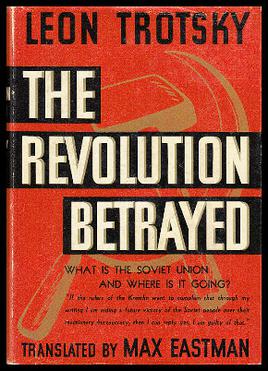
The Revolution Betrayed: What Is the Soviet Union and Where Is It Going? is a book published in 1936 by the exiled Soviet leader Leon Trotsky. This work analyzed and criticized the course of historical development in the Soviet Union following the death of Vladimir Lenin in 1924 and is regarded as Trotsky's primary work dealing with the nature of Stalinism. The book was written by Trotsky during his exile in Norway and was originally translated into Spanish by Victor Serge. The most widely available English translation is by Max Eastman.
Revolutionary socialism is a political philosophy, doctrine, and tradition within socialism that stresses the idea that a social revolution is necessary to bring about structural changes in society. More specifically, it is the view that revolution is a necessary precondition for transitioning from a capitalist to a socialist mode of production. Revolution is not necessarily defined as a violent insurrection; it is defined as a seizure of political power by mass movements of the working class so that the state is directly controlled or abolished by the working class as opposed to the capitalist class and its interests.
In Trotskyist political theory, a degenerated workers' state is a dictatorship of the proletariat in which the working class' democratic control over the state has given way to control by a bureaucratic clique. The term was developed by Leon Trotsky in The Revolution Betrayed and in other works.

Trotsky: A Biography is a biography of the Marxist theorist and revolutionary Leon Trotsky (1879–1940) written by the English historian Robert Service, then a professor in Russian history at the University of Oxford. It was first published by Macmillan in 2009 and later republished in other languages.

Terrorism and Communism: A Reply to Karl Kautsky is a book by Soviet Communist Party leader Leon Trotsky. First published in German in August 1920, the short book was written against a criticism of the Russian Revolution by prominent Marxist Karl Kautsky, who expressed his views on the errors of the Bolsheviks in two successive articles, Dictatorship of the Proletariat, published in 1918 in Vienna, Austria, followed by Terrorism and Communism, published in 1919.
















